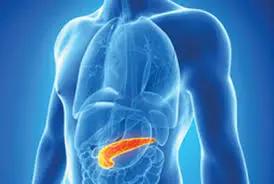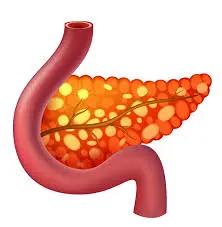The pancreas plays a major role in the body, but when the cells in this organ are disrupted or become inflamed the body can’t function correctly and pancreatitis occurs. Inflammation of the pancreas can lead to severe pain in the abdominal area, malnutrition and weight loss. If the symptoms remain for a short period and begin suddenly it is considered acute pancreatitis, however if the condition is persistent, patients will develop chronic pancreatitis. There are many reasons why this may happen including drinking alcohol and various health conditions. Let’s take a deeper look into the causes of chronic pancreatitis.
How does the pancreas work?
The pancreas is a small, pear-shaped organ that sits behind the stomach. It has two important bodily functions: producing enzymes that help digest food (endocrine pancreas) and producing hormones that help regulate blood sugar levels (exocrine pancreas). The pancreas comprises two main cell types: exocrine cells and endocrine cells. Exocrine cells make up the vast majority of the pancreas and produce enzymes that are released into the small intestine to help break down food. When these cells become inflamed or disrupted pancreatitis can occur suddenly known as acute pancreatitis and repeated episodes of acute pancreatitis lead to chronic pancreatitis.
What is the difference between acute and chronic pancreatitis?
Acute pancreatitis comes on suddenly. It is a short-term condition lasting days to weeks that resolves with treatment quickly. The damage to the pancreatic cells is reversible with appropriate treatment and the pancreas recovers. This condition can affect people of any age and normally requires hospitalisation and pain relief. Blood amylase or lipase levels are typically elevated 3 times the normal level during acute pancreatitis. According to the charity Guts UK, 8 out of 100 people with acute pancreatitis may go on to develop chronic pancreatitis.
Chronic pancreatitis is the result of the inflammation coming back time after time. In this situation, there is permanent scarring and damage to the pancreas including calcium stones and cysts that may develop in your pancreas, which can block the duct that carries digestive enzymes and juices to your stomach. All this inflammation causes chronic pain and gastrointestinal issues. In the UK according to Guts UK between 6,000 and 12,000 people are given a new diagnosis every year.
Causes and risk factors
Chronic pancreatitis has multiple causes and risk factors. Let’s explore the most common ones.
Alcohol abuse
Long-term alcohol use is the most common cause of chronic pancreatitis, responsible for about 7 out of 10 cases. Heavy drinking over several years can repeatedly damage the pancreas. It’s important to note that only a minority of people who regularly consume alcohol develop this condition. The risk increases with the amount and duration of alcohol consumption, typically manifesting in men aged 30-40 who are long-term heavy drinkers.
Genetic factors
Genetics plays a crucial role in hereditary pancreatitis. Mutations in genes like PRSS1, SPINK1, and CFTR can increase susceptibility to the condition. The CFTR gene is responsible for cystic fibrosis. Genetic factors often interact with environmental stressors, making the disease truly complex.
Certain medications
Some prescribed medications can cause chronic pancreatitis. Examples include azathioprine and sodium valporate.
Other causes
There are various other causes of chronic pancreatitis:
- Gallstones that cause a blockage of the pancreatic duct
- Autoimmune disorders (autoimmune pancreatitis), where the body’s immune system attacks the pancreas
- Metabolic disorders
- Trauma
- Smoking
- High triglyceride levels (hypertriglyceridemia)
- High calcium levels (hypercalcemia)
- Family history of pancreatitis
Sometimes, a cause for pancreatitis is never found. This is known as idiopathic pancreatitis.
Symptoms of chronic pancreatitis
Chronic pancreatitis symptoms can vary from person to person, but we often see some common signs in patients.
Abdominal pain
This pain typically occurs in the upper abdomen, just below the ribs, and can range from mild to severe. In some cases, we’ve seen the pain spread into the back. Interestingly, some patients find relief by leaning forward or sitting up. The pain may be constant or come and go, often worsening after meals.
Digestive issues
Chronic pancreatitis has a significant impact on digestion. Many patients experience gastrointestinal symptoms such as nausea, vomiting, and diarrhoea. Large volumes of loose, pale, and foul-smelling stools that are difficult to flush are a classic symptom. The damaged pancreas struggles to produce enough digestive enzymes, leading to poor fat absorption.
Weight loss
Unintentional weight loss is another common symptom we see with chronic pancreatitis. This occurs due to a combination of factors. The pain and discomfort often reduce appetite, causing patients to eat less. Also, the pancreas’s inability to produce sufficient digestive enzymes results in the malabsorption of nutrients.
What are the best treatment options for chronic pancreatitis?
Managing chronic pancreatitis symptoms involves some different approaches. Reducing pain, improving digestive function, and changing lifestyle, contributes to the condition.
Pain management
Pain control is central to treating chronic pancreatitis. Mild pain relief like paracetamol or non-steroidal anti-inflammatory drugs (NSAIDs) are usually started first. If these aren’t effective stronger medications such as opioids may be prescribed. Healthcare professionals are cautious about long-term opioid use due to the risk of dependence. In some cases, nerve blocks, endoscopic procedures or surgery may be recommended to relieve severe, persistent pain.
Enzyme therapy
Many patients with chronic pancreatitis have difficulty digesting food due to insufficient enzyme production. Pancreatic enzyme supplements are prescribed to help with this issue. These supplements contain lipase, amylase, and protease, which assist in breaking down fats, carbohydrates, and proteins. These enzymes are taken with every meal and snack to improve how you digest food, absorb nutrients and reduce symptoms like diarrhoea and weight loss.
Lifestyle changes
Patients with chronic pancreatitis are strongly encouraged to make significant lifestyle changes to manage their chronic pancreatitis symptoms. The most important change of all is to stop drinking alcohol, even if it wasn’t the main cause of the condition. Continuing to drink can lead to more severe complications and potentially life-threatening situations. Patients are also encouraged to quit smoking, as it can accelerate pancreatic damage and put them at increased risk of pancreatic cancer. Additionally, a low-fat healthy diet high in nutrients to support overall pancreatic function and prevent complications like diabetes is recommended.
Diagnosis
Diagnosing chronic pancreatitis can be challenging, especially in its early stages.
Imaging tests
- CT scans and X-rays are particularly useful in identifying complications such as pseudocysts and biliary obstruction
- Magnetic resonance imaging (MRI) and magnetic resonance cholangiopancreatography (MRCP) techniques are especially helpful in detecting subtle ductal changes and assessing pancreatic exocrine function
- Endoscopic ultrasound (EUS) helps detect early ductal changes and pancreatic pseudocysts that might not be visible on CT or MRI scans
Blood tests
Blood tests to measure levels of pancreatic enzymes. Amylase and lipase are the most common enzymes checked for.
Complications of chronic pancreatitis
- Sacs of fluid on the surface of the pancreas (pseudocysts) can cause bloating, indigestion and dull tummy pain. If these sacs rupture it can cause complications such as internal bleeding, infection or block a bile duct
- Blockage of the ducts draining the pancreas and gallbladder, which can lead to jaundice (yellowing of the skin)
- Diabetes type3c may develop due to the inability of the pancreatic islet cells to produce insulin to regulate glucose levels
Conclusion
Understanding the causes of chronic pancreatitis is important in managing this condition effectively. We’ve looked at the common causes, including alcohol consumption, genetic factors and gallstones. Treatment options focus on pain management, enzyme replacement therapy, and lifestyle changes to improve the quality of life for those affected.
Sources
- Pancreatitis – Symptoms and causes – Mayo Clinic
- About the Pancreas – National Pancreas Foundation
- Chronic Pancreatitis – StatPearls – NCBI Bookshelf
- Chronic pancreatitis – Guts UK
Medical Disclaimer
NowPatient has taken all reasonable steps to ensure that all material is factually accurate, complete, and current. However, the knowledge and experience of a qualified healthcare professional should always be sought after instead of using the information on this page. Before taking any drug, you should always speak to your doctor or another qualified healthcare provider.
The information provided here about medications is subject to change and is not meant to include all uses, precautions, warnings, directions, drug interactions, allergic reactions, or negative effects. The absence of warnings or other information for a particular medication does not imply that the medication or medication combination is appropriate for all patients or for all possible purposes.








